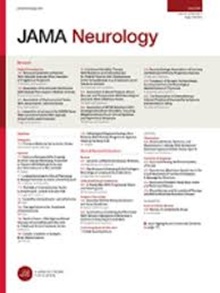Risk of Inflammatory Central Nervous System Diseases After Tumor Necrosis Factor–Inhibitor Treatment for Autoimmune Diseases
IF 20.4
1区 医学
Q1 CLINICAL NEUROLOGY
引用次数: 0
Abstract
ImportanceTumor necrosis factor (TNF) inhibitors have been used extensively to treat various autoimmune diseases. However, there are ongoing debates about the risk of inflammatory central nervous system (CNS) disease events following TNF inhibitor therapy, as well as uncertainty about how this risk varies across different autoimmune diseases or TNF-blocking agents.ObjectiveTo evaluate the risk of inflammatory CNS diseases after anti-TNF initiation and assess the difference in risk among different types of underlying autoimmune diseases or TNF inhibitors.Data SourcesSeparate searches were conducted across PubMed, Embase, and the Cochrane Library from inception until March 1, 2024.Study SelectionObservational studies assessing the association between anti-TNF therapy and inflammatory CNS diseases relative to a comparator group.Data Extraction and SynthesisStudy eligibility assessment and data extraction were independently conducted by 2 investigators following PRISMA guidelines. The risk ratio (RR) was used as the effect measure of the pooled analysis.Main Outcomes and MeasuresThe primary outcome was the risk of incident inflammatory CNS events after anti-TNF therapy for autoimmune diseases. Secondary analyses were performed based on different types of underlying autoimmune diseases and TNF inhibitors.ResultsEighteen studies involving 1 118 428 patients with autoimmune diseases contributing more than 5 698 532 person-years of follow-up were analyzed. The incidence rates of new-onset inflammatory CNS events after initiating TNF inhibitors ranged from 2.0 to 13.4 per 10 000 person-years. Overall, exposure to TNF inhibitors was associated with a 36% increased risk of any inflammatory CNS disease compared to conventional therapies (RR, 1.36; 95% CI, 1.01-1.84;肿瘤坏死因子抑制剂治疗自身免疫性疾病后患中枢神经系统炎症性疾病的风险
重要性肿瘤坏死因子(TNF)抑制剂已被广泛用于治疗各种自身免疫性疾病。目的评估抗肿瘤坏死因子治疗后中枢神经系统(CNS)炎症性疾病的风险,并评估不同类型的基础自身免疫性疾病或肿瘤坏死因子抑制剂的风险差异。数据来源在PubMed、Embase和Cochrane图书馆中分别进行了检索,检索时间从开始至2024年3月1日。研究选择评估抗TNF治疗与炎症性中枢神经系统疾病之间相对于比较组的关联性的观察性研究。主要结果和测量指标主要结果是抗肿瘤坏死因子治疗自身免疫性疾病后发生炎症性中枢神经系统疾病的风险。结果分析了18项研究,涉及1 118 428名自身免疫性疾病患者,随访时间超过5 698 532年。开始使用TNF抑制剂后,新发中枢神经系统炎症事件的发生率为每10,000人年2.0至13.4例。总体而言,与传统疗法相比,接触TNF抑制剂后患任何炎症性中枢神经系统疾病的风险增加了36%(RR,1.36;95% CI,1.01-1.84;I2,49%),主要归因于脱髓鞘疾病(RR,1.38;95% CI,1.04-1.81;I2,31%)。二次分析显示,不同类型的潜在自身免疫性疾病(风湿性疾病:RR,1.36;95% CI,1.04-1.81;I2,31%)患中枢神经系统炎症性疾病的风险相似:RR,1.36;95% CI,0.84-2.21;炎症性肠病 1.49;95% CI,0.93-2.40;亚组 P = .74)和 TNF 抑制剂(抗 TNF 单克隆抗体 vs etanercept,RR,1.04;95% CI,0.93-2.40;亚组 P = .74):结论与相关性与传统疗法相比,无论是否患有自身免疫性疾病或TNF抑制剂类型,接触TNF抑制剂都会导致中枢神经系统炎症性疾病的风险增加36%。
本文章由计算机程序翻译,如有差异,请以英文原文为准。
求助全文
约1分钟内获得全文
求助全文
来源期刊

JAMA neurology
CLINICAL NEUROLOGY-
CiteScore
41.90
自引率
1.70%
发文量
250
期刊介绍:
JAMA Neurology is an international peer-reviewed journal for physicians caring for people with neurologic disorders and those interested in the structure and function of the normal and diseased nervous system. The Archives of Neurology & Psychiatry began publication in 1919 and, in 1959, became 2 separate journals: Archives of Neurology and Archives of General Psychiatry. In 2013, their names changed to JAMA Neurology and JAMA Psychiatry, respectively. JAMA Neurology is a member of the JAMA Network, a consortium of peer-reviewed, general medical and specialty publications.
 求助内容:
求助内容: 应助结果提醒方式:
应助结果提醒方式:


